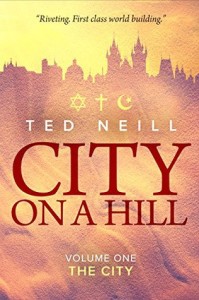City on a Hill by Ted Neill is an epic tale of belief, chaos and conflict.
While many post-apocalyptic, dystopian novels center on the ravages of atomic fallout, the wasteland lifestyle of survivors, unholy abominations or alien overlords, there are few books in the genre that have placed religion as the focal point. City on a Hill is the bold and provocative tale of Lysander and Fortinbras, the Twin Cities, the last two havens in a world destroyed by violence and religious conflict. Following the Cataclysm, the new leaders of the world, the Head Ministry, have outlawed religion in all its forms, and subjugated the few survivors of the human race within a rigid society that is unmistakably reminiscent of Orwell’s vision in 1984.
However, spirituality is impossible to quench, as Sabrina Sabryia, a young police cadet soon discovers. Growing up with a best friend, Lindsey Medhina, who regularly experienced prophetic visions, Sabrina at times finds it difficult to fit into her role as an authoritarian drone of the Head Ministry. Religious tension seems to be growing in the city, occultist rebels are acting more desperate every day, and there is even talk of “God” being found somewhere out in the desert. Sabrina tries her best to carry out her sworn duty, without betraying her oldest friend or digging too deeply into the company she keeps, but a conflict seems inevitable. When Lindsey’s divine purpose within the new world order becomes apparent, Sabrina is forced to make the hardest choice of her life.
Although these two characters couldn’t be further apart in terms of their beliefs, their friendship is the one thing they do trust, and it launches them on an epic quest into the irradiated wasteland, seeking answers to questions that the Ministry would prefer to bury in the sand forever. This book celebrates the power of faith and truth, and argues that friendship and understanding will always be superior to force, deception and unchecked control.
The allegories within the story, from the ancient central city of a global conflict to the brutal to the isolationist philosophy of the Ministry, all hint at places and problems currently terrorizing the real world. However, the Dystopian creativity of the plot keeps those similarities at a thoughtful distance, stimulating readers to think critically without beating them over the head with symbolism or veiled intent.
The writing itself is very strong, exhibiting a perfect blend of exposition, dialogue, action and muse-worthy narration. The peripheral characters are intriguing and believable; some are easy to love, while others readers will love to hate. The core of the entire story, however, is the relationship between Lindsey and Sabrina. From the first formative scene to the mirroring moment at the end of the book’s first section, these two characters grow and develop before our eyes, finding their place in a world that is much larger and more dangerous than either had previously believed.
The philosophical questions posed by the book are slow burning – gradually sneaking up through the subtext of the plot and leaving readers with fresh opinions of their own, and hopefully a new respect for “outsiders” who see life through different lenses. Thankfully, the author does not force his opinion on readers, merely presenting the dangers of extremism in either direction.
The resolution of the novel suggests that harmony can only be achieved through moderation, understanding, communication and honesty. While this fits neatly into the premise of the plot, it also reveals the author’s deeper sensitivity and ambition to write for a higher purpose. Overall, City on a Hill is a shining example of what great fiction should be: entertaining, thought provoking, polished, and professional.
Links
Twitter
Amazon
Goodreads
Review Overview
Design
Editing
Content
Get an Editorial Review | Get Amazon Sales & Reviews | Get Edited | Get Beta Readers | Enter the SPR Book Awards | Other Marketing Services
























Leave A Comment